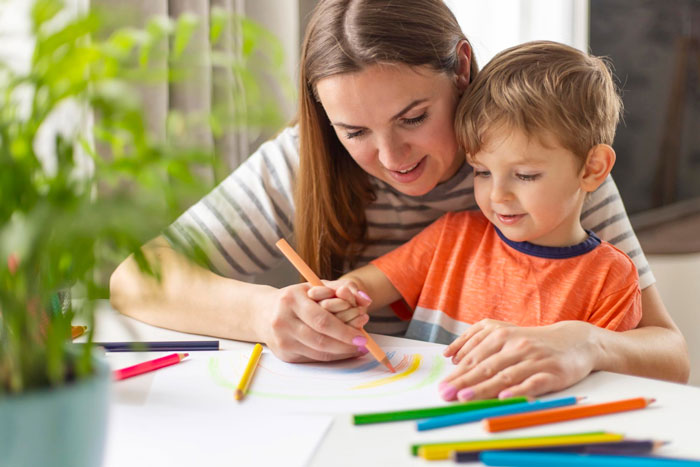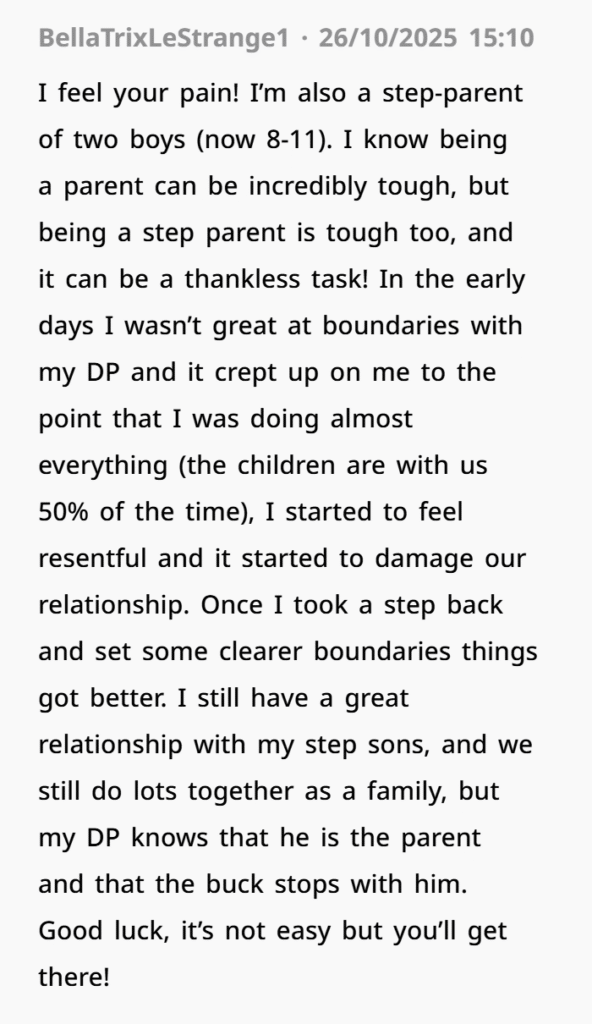Man Dumps All Parenting on His Fiancée, Leaving Her Questioning What Stepparenting Even Is
You’ve painted a vivid picture: you’re in a committed relationship and soon to be married with a wonderful little boy (your partner’s son). You step in happily, you organise the morning, you invest energy into making things fun. And when your partner returns, there is… silence. No hello. No thanks. The vibe shifts. He’s cold, disconnected, not acknowledging your effort. And you’re left wondering: is it unreasonable to expect a little gratitude? And more broadly — is this the life of a stepparent?
On one hand you’re involved, you care, you’re active. On the other hand, you’re not the biological parent, you’re in a role that often lacks clear definition and acknowledgement. You’ve moved into a space somewhere between friend/partner/parent-figure. The question “Am I being unreasonable?” is valid. The answer: no, you’re not. But your expectations might need some recalibrating given what research says about step‑family dynamics.
Below I’ll walk through what the studies show about stepparenting — role ambiguity, emotional labour, expectations vs. reality — so you can see where you’re at, why things feel odd, and maybe how to navigate it from here.
Parents and stepparents need to be a team and work together to look after their children, instead of one person having to take on all the responsibilities

The poster explained that she’s going to get married to her fiancé soon and that even though they have no children together, she enjoys spending time with his kid








1. Role ambiguity in stepfamilies
One of the foundational issues in step‑family functioning is the lack of a clear, socially agreed role for the stepparent. Research shows that unlike biological parenthood, where society has a fairly clear script (“you’re the parent, you care for the child, you discipline, you love”), stepparents often operate in a grey zone. For example, a study titled “A Study of Perceptions of the Stepparent Role” found that there’s no consistent expectation about what stepparents should and will do. journals.sagepub.com
Another qualitative analysis looked at “transition days” in stepfamilies (when children move between households) and found three themes: the stepparent’s role and authority, role ambiguity, and the move from single status to having children around. SCIRP
What does this mean for you? It means your situation — stepping in to entertain, care, create a morning with the child and expecting acknowledgement — exists without a defined framework. It’s normal that you feel states of invisibility or under‑appreciation because your contributions are not always socially scripted or valued.
2. Emotional labour, invisible work & expectation mismatch
Being a stepparent often involves a lot of “invisible work” — you’re doing the things: planning, engaging, being present, stepping in when the biological parent is unavailable. But this work may go unnoticed. Many stepparents report feeling like they are doing extra effort but not getting the recognition.
Research on stepparent–child relationship quality shows that positive relationships matter a lot for stepfamily functioning. For example: “A systematic review of correlates of stepparent–child relationship quality” found that the relationship between the stepparent and the stepchild is central to the overall health of the blended family environment. Wiley Online Library
Yet, because the stepparent role is ambiguous, the person may feel like they’re giving and giving and rarely receiving acknowledgement or defined place/time for being “the adult” in charge. You might feel emotionally taxed: “I planned, I did, I helped, I expected…” — and then nothing. Which triggers frustration, hurt, perhaps resentment.
In your case, you mention organising the morning, being present since 8 am, yet your partner comes back and the vibe shifts. That matches many step‑family narratives: the stepparent works behind the scenes, the biological parent takes over, and the transition is rough.
3. Gratitude & recognition in blended families
Does research say stepparents should expect gratitude? Yes and no. It says that recognition and meaningful feedback helps a lot in building a stepparent‑stepchild relationship and overall family cohesion. For example, adult step‑children reflecting back identified “prosocial actions” (acts that show value, kindness, surprise) and quality time as turning points in the relationship with their stepparents. Institute for Family Studies
In simpler terms: when a stepparent does something genuinely kind or “above and beyond”, or makes the child feel seen and wanted (“I treat you like my own”), it becomes a relationship booster. But this doesn’t always translate into the biological parent or household automatically realising and saying “thank you, your role matters”. Recognition often needs to be explicitly established.

Since you’re in a relationship where you’re contributing, you’re reasonable to feel under‑noticed. But the fact that you feel this way signals there’s a mismatch between your internal script (“I’m stepping in, I’m helping”) and your partner’s or system’s script (“this is just part of what occurs, no thanks needed”). The key question: is this mismatch sustainable for you?
4. What stepparents say: boundaries, communication, self‑care
Stepparenting isn’t just about stepping in — it’s about negotiating boundaries, defining roles, and protecting your emotional well‑being. Many sources emphasise that one of the most helpful things is open communication with your partner: What are your expectations? Who does what? How do we acknowledge effort?
According to “Navigating The Joys and Challenges of Step‑Parenting” (2024) the authors say:
“Acknowledging the complexity … Taking care of your emotional well‑being is crucial… No perfection, only progress.” jaiinstituteforparenting.com
Here are some practical pieces of advice drawn from research and practice (that might help in your situation):
- Set clear expectations with your partner. If you’re going to look after his son for hours, check in: “When you get back, can we have a few minutes together so you can see what we did?” Or “I’d appreciate a thank you—it helps me feel seen.”
- Negotiate acknowledgement and shared roles. You did afternoon play, you did morning care. It’s reasonable to ask: “Can we do a quick handshake/thanks when you come home? It matters to me.”
- Re‑evaluate how you measure value. If you’re investing emotional and physical labour, but not getting external thanks, you might need to internally recognise your contribution (not wait for it).
- Watch for resentment building. If you keep feeling invisible, ignored, undervalued, it can build bitterness. In blended families, unresolved resentment is one of the top risk factors for dysfunction. SCIRP+1
- Know it’s OK to not always be “all‑in”. If your partner comes home cold, hungry and disconnected, you don’t have to collapse or silently absorb. You can say: “I did X for the morning while you were away. Could you please join us for a minute so we can show you the drawings?”
- Balance your own needs. Just because you’re in a supporting role doesn’t mean you lose your voice. You can ask for recognition, rest, support from your partner.
5. Is this “normal” for stepparents — yes, to a degree
Your feelings are valid and fairly common in step‑family literature. The “transition daze” described in research means those days when children move between homes, and the stepparent’s role often gets lost in the shuffle. SCIRP
Also the “step‑parent role and ambiguity” theme from the same study:
Stepparents must work unceasingly to develop new bonds. SCIRP
So yes — many stepparents feel like they invest, wait, hope for inclusion or acknowledgement, and experience periods where the biological parent returns and resets the dynamic without visible recognition of what happened in the partner’s absence. It doesn’t mean it’s right, but it means you’re experiencing a known dynamic.

6. What this means for you right now
Given your story:
- You’re doing well. You’re involved, you’ve built a good relationship with DSS (the child). You’ve created fun, you’ve stepped in when needed. That is a strong foundation.
- Your partner’s lack of acknowledgment is not unreasonable to feel hurt about. It signals a mismatch in your internal expectation vs the real dynamic.
- This is a good moment to use your voice: you might say something like, “Hey, thanks for trusting me this morning with [child]. I had fun with him. When you returned it felt like the energy dropped. I’d like it if when you come back we could have a moment together so you can reconnect with us before you retreat into your phone or shower.”
- Also recognise you’re not only supporting the child, you’re supporting your relationship with your partner — implicitly you’re adding value to the family structure. That deserves acknowledgement.
- Smooth the transition for everyone: children feel the shift when the parent returns coldly. Your partner might be tired/hungry/unwell — fine, but simple acknowledgement matters: “Thanks for managing things this morning” is low‑cost/high‑impact.
Most people felt that the man was taking advantage of his fiancée and that she shouldn’t just do all the childcare for him








So, is this really the life of a stepparent? Yes — in the sense that you’re navigating a complex role, doing significant care‑work behind the scenes, balancing your own emotional needs, and often operating without explicit scripts or gratitude. But it doesn’t mean your feelings of wanting to be seen or appreciated are wrong. They’re entirely valid.
What you’re experiencing is the edge of the “stepparent triangle” (you – child – partner) where the middleman role often means you’re overlooked. But that also presents an opportunity: to clarify your role, voice your needs, set a pattern of respect and recognition in your household — before expectations build resentment.

